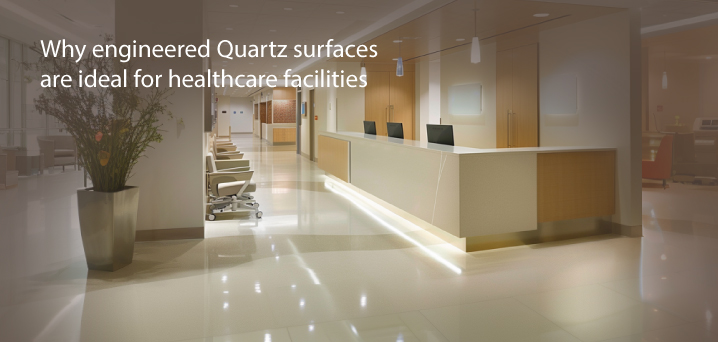If covid-19 pandemic has taught us anything, it is the importance of washing our hands. But we
don’t wash our hands nearly as often as we come in contact with different kinds of surfaces.
A recent study found that several high-touch surfaces in the Central Texas Veterans Health
Care Systems were a breeding ground for multiple colonies of bacteria despite the hospital’s
adherence to routine disinfection strategies. Of the 60 types of pathogens, seven were
categorised as important because of their potential to cause HAIs (Healthcare Associated
Infections).
The study also noted that while many of the organisms identified were initially considered
harmless, recent advances in bacterial identification suggest that a few of them have the
potential to be opportunistic pathogens. Hence, cleaning those surfaces or using more bacteria-
resistant surfaces play a much bigger role in preventing the spread of bacteria and pathogens.
You must be thinking if there is any other way to operate in a safe and hygienic environment
without the fear of infections. The answer is ‘quartz’.
Quartz surfaces are commonly found in kitchen countertops. But there’s something about them
that makes them ideal for healthcare facilities, where cleanliness is of paramount importance.
Let’s dive into the perks that make Quartz surfaces the number one choice.
- Hygienic properties: Healthcare facilities have more potential to carry disease-causing germs than all kinds of public places combined. Hence, sanitising and upgrading their infrastructure to surfaces that promote hygiene has become a necessity. Quartz surfaces are non-porous in nature, which means they do not absorb any liquids easily. These liquids can carry bacteria and pathogens, which can spread to the surfaces if absorbed. Quartz is also easy to clean and maintain compared to other surfaces.
- Durability: Quartz countertops are highly durable, scratch-resistant, and long-lasting. This makes them an ideal choice for facilities like hospitals that require a budget for maintenance, repair costs and renovations. This durability also ensures that the infrastructure doesn’t end up looking run down with time and withstands the demands of a healthcare environment.
- Aesthetic value: Healthcare facilities often get a bad rap for having a dull and gloomy atmosphere and infrastructure. But contrary to popular belief, many hospitals use Quartz countertops for their reception areas, waiting rooms, guest bathrooms, etc. Quartz mimics the look of natural stones like marble or granite and comes in a plethora of designs and hues. This makes each countertop unique and eye-catching. This also creates a warm, welcoming, and positive atmosphere for the patients and visitors.
- Safety and sustainability: Engineered Quartz surfaces are known to be rust-proof, corrosion-resistant and anti-bacterial in nature. Additionally, they aren’t fazed by chemicals and high temperatures, making them a safe and sustainable option for healthcare facilities.
- Low maintenance: It’s one thing to make an informed decision on which surface is the right fit for a healthcare space. But the real deal is to maintain the quality of the surface with all the daily wear and tear and the amount of people that come in contact with it. Engineered Quartz surfaces come with a variety of perks such as not requiring sealing or special treatments of any kind that make them very user-friendly and low on maintenance and repair.
- Fire Resistance: Hospitals and healthcare facilities have strict fire safety regulations. Quartz is a fire-resistant material, meaning it won’t easily ignite or contribute to the spread of flames. This adds another layer of safety for patients, staff, and the building itself.
- Seamless Integration: Unlike some surfaces with grout lines or seams, quartz countertops can be fabricated with seamless joints. This minimizes the chance of bacteria harboring in hidden crevices, making it easier to maintain a truly clean environment.
- Stain Resistance: Healthcare facilities deal with a variety of spills, from bodily fluids to medications. Quartz is highly stain-resistant compared to other materials like wood or natural stone. This makes it easier to maintain a pristine appearance and reduces the risk of permanent discoloration.
- Repair Potential: While highly durable, minor scratches or chips can occur on any surface over time. Unlike some materials that require complete replacement, quartz countertops can often be repaired on-site by qualified professionals. This minimises downtime and keeps costs lower in the long run.
- Environmentally Friendly: Quartz is a manufactured material that incorporates recycled materials in its composition. Additionally, its low-maintenance nature reduces the need for harsh cleaning chemicals. These factors contribute to a more sustainable building environment.
Healthcare facilities are paradoxically known for providing medical aid and being susceptible to bacteria and germs as well. There are times when people in facilities like doctor’s offices or hospitals fail to adhere to basic practices of hygiene such as coughing up phlegm into a tissue paper or into the elbow. Hence, surfaces catch on to those germs faster than we can ever imagine. They transfer them to other people if they come in contact. The only realistic way of breaking that cycle is to switch to anti-bacterial surfaces like Quartz.
In 2020, Jyothi Enterprises identified an increasing gap between the global demand and supply of quality quartz stones and ventured into engineered quartz manufacturing. Leaving no stone unturned, they laid the foundations of Jyothi Quartz Surfaces, to deliver a future that’s fascinating, lustrous, and rock solid. Quartz surfaces not only provide the right ingredients to create a safe healthcare environment but also solidify the trust between the patient and the healthcare provider. On the whole, it helps the healthcare system operate with ease.


